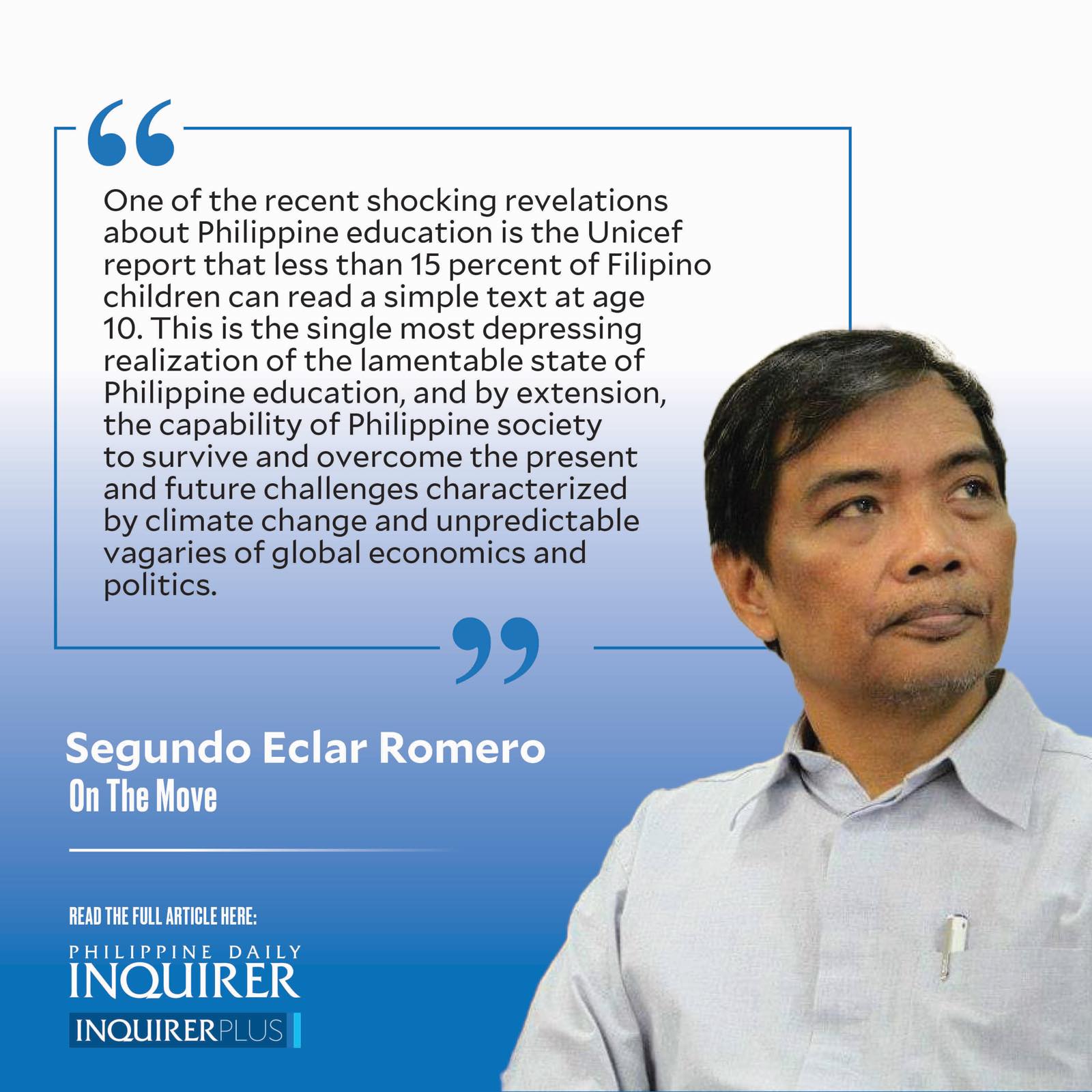Collaborative approach to education reform

One of the recent shocking revelations about Philippine education is the Unicef report that less than 15 percent of Filipino children can read a simple text at age 10. This is the single most depressing realization of the lamentable state of Philippine education, and by extension, the capability of Philippine society to survive and overcome the present and future challenges characterized by climate change and unpredictable vagaries of global economics and politics. Future generations are missing out, for as the adage says: “Literacy is not just about reading words; it’s about unlocking worlds.”
The Philippines has over decades attempted to arrest the deteriorating state of Philippine education since the 1970s. Public education is now free from the primary level to college with the Universal Access to Quality Tertiary Education Act. Over the past decade, the country has aimed to transform the educational system by adding two years to pre-collegiate education and introducing a new K-12 curriculum.
That modification has been found to be wanting, and a new K-10 curriculum has been developed and is now being piloted. Still, there is not much public confidence that the educational system will serve as a reliable, capable, and sustainable foundation for preparing people for livelihoods and social, economic, and political life in 21st-century society. Many people feel education is too important to leave to the Department of Education (DepEd) and Commission on Higher Education alone.
A growing wave of self-help initiatives at the local level is demonstrating the power of community-driven solutions. The struggle to address the shortcomings in the educational system has prompted innovative approaches, with local governments taking the lead in fostering change.
One noteworthy example is the Gerona Innovative Roving Interactive Instructional Materials for Diverse Educational Needs (G-iRide) system, a mobile school initiative designed to boost the Alternative Learning System (ALS) in Central Luzon. At the heart of the iRide system is a solar-powered, disaster-proof Interactive Multimedia Teaching Aid consisting of a 50-inch television-equipped system that contains the PowerPoint presentations of the modules and lessons of ALS teachers. This mobile ALS-enabling system is mounted on an old ambulance that has been repurposed into a mobile school presentation platform.
This innovation may not sound much, but the point is that what sets this project apart is its collaborative nature, bringing together the ALS DepEd of Tarlac province, the local government of Gerona, and Tarlac State University. This partnership symbolizes a broader trend of local multisectoral collaborations involving national government agencies, local government units, and higher education institutions.
The success of such initiatives hinges on a shift in the role of the national government. Instead of assuming a central position, the national government should adopt a supportive stance, allowing local entities to take the lead. This decentralization approach is rooted in the belief that local governments and institutions, when adequately empowered, can effectively address the unique challenges they face.
The call for national support is not a plea for financial assistance alone but a holistic collaboration that brings knowledge, expertise, frameworks, resources, capabilities, and opportunities to the forefront. The idea is clear: the national government should help local communities help themselves. By providing the necessary support, the national government can catalyze a sustainable transformation in education and community development.
A critical aspect of this national support is the honest evaluation of local initiatives. Rigorous assessments can identify areas for improvement, ensuring that targeted interventions address specific challenges. This evaluation process is not about criticism but about refining and enhancing local efforts, fostering a culture of continuous improvement.
If regular and formal education is in trouble, the outcomes of ALS may be worse. This much may be gleaned from a study of 150 ALS learners across five schools in Northern Philippines that concludes that ALS learners have a low level of acquisition of the 21st-century skills that ALS are designed for—critical thinking, collaboration skills, communication skills, creativity and innovation skills, self-direction skills, global connections, local connections, and using technology as a tool for learning (see https://bitly.ws/YTVr).
The lowest rating is the integration of ICT in learning, which makes the G-iRide and similar initiatives critical to ALS. It is not only the hardware and software that needs improvement, but also the teacher-ware.
Empowering local initiatives does not mean relinquishing responsibility but rather creating a more dynamic and responsive education system. As the nation grapples with the challenges of political succession and resource constraints, the key to sustainable progress lies in recognizing and nurturing the potential within local communities.
—————-
doyromero@gmail.com




















